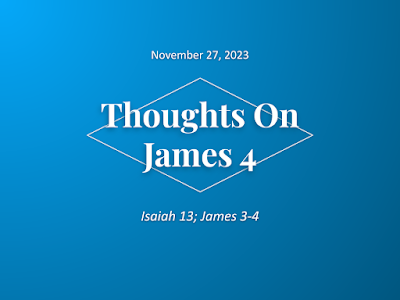Today’s reading: Isaiah 13; James 3-4
James’ command not to judge our neighbors is not an instruction to refuse to call sin sin.
In chapter 4 James says,
“Do not speak evil against one another, brothers. The one who speaks against a brother or judges his brother, speaks evil against the law and judges the law. But if you judge the law, you are not a doer of the law but a judge. There is only one lawgiver and judge, he who is able to save and to destroy. But who are you to judge your neighbor?”
There are a handful of instructions similar to this throughout the New Testament, some of them coming from Jesus Himself. Unfortunately, these instructions have been interpreted by too many churches today to mean that we cannot call sin what God declares to be sin. Even actions and behaviors that the Bible unequivocally says are wrong, many churches today will not only refuse to call wrong, but will even endorse, saying, “Who are we to judge?”
It is not our place to decide who is going to Heaven and who is going Hell, that is the unique purview of God, delegated to Jesus. We do not get to judge people, but that does not mean we are not to warn people of the coming judgment. As James specifically says, there is a lawgiver and judge by whom people will be judged. But if we refuse to call sin sin, if we refuse to tell people that God has said what they are doing is wrong, then how will they know that they need a savior?
The cultural notion lately has been that, as long as whatever you are doing doesn’t negatively impact other people (which is a very subjective measure), then nobody can tell you that it’s wrong. Lately, this has gone even further to really require, not just that nobody says what you are doing is wrong, but that everyone actively endorses what you are doing, calling it good. Unfortunately, many churches have bought into this way of thinking, straying from clear Biblical teaching, refusing to call sin sin, trying to justify it as following this instruction to not “judge your neighbor.”
But the fact that James has not been afraid to call out sin in the rest of this letter should tell us that this is not what he means when he tells us not to judge our neighbor. In fact, at the end of the paragraph right before this one, James himself says, “Cleanse your hands, you sinners, and purify your hearts, you double-minded. Be wretched and mourn and weep. Let your laughter be turned to mourning and your joy to gloom. Humble yourselves before the Lord, and he will exalt you.” Those in sin needed to be told they were in sin and told of their need to humble themselves before the Lord as a result of their sin.
We aren’t doing anybody any favors when we refuse to call sin what God says is wrong. It is not loving or good to call sin “good” in the name of not judging. All that does is hasten people on their way to Hell, possibly never knowing that God has something so much better for them than their sin…


No comments:
Post a Comment